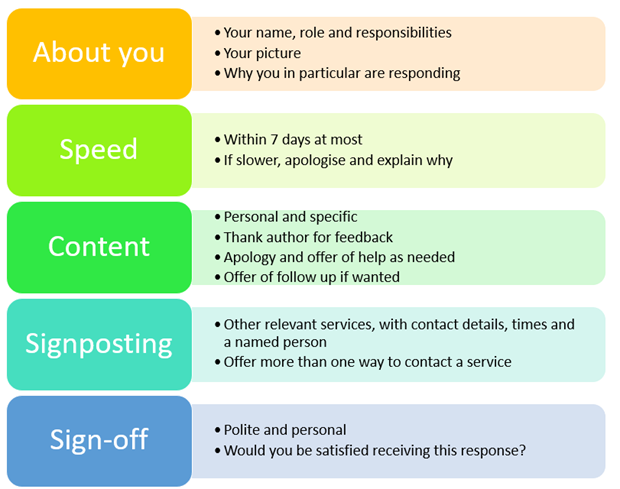
Over the years we have been running Care Opinion, the response rate to people's stories has steadily risen. You can see the current response rate on our home page. In Scotland, about 96% of stories receive a response, and in England about 82%.
But what makes a "good" response? What do story authors want to see in the responses they receive? And how good are the responses people actually get?
These questions are at the heart of research recently published in the journal Health Expectations by Rebecca Baines and colleagues at Plymouth University, .
Working with a mental health patient-research partner, Baines examined the responses to 245 stories on Care Opinion posted about mental health services, identifying 19 possible features which appeared important to response quality. These were subsequently discussed and refined by a service user and carer stakeholder group.
I have summarised these features, none of which appear complex or unreasonable, in the diagram below.
Good practice in responding
You can find further detail and explanation of these features in the original paper.
Having identified these features, the researchers then looked at all the responses again, to see how often the desired features were actually present. While some aspects of a high quality response were often present (like thanking the author for posting), other aspects were almost always absent (like the responder explaining their role in the organisation).
Learning from this research
At Care Opinion we are keen to learn from this research (and we are keen that responders learn from it too!). We are currently considering how we could evolve our platform so as to support and encourage higher quality responses.
We are also thinking about how we could measure the quality of responses in real-time, and feed this information back to our subscribers. I'll keep you posted as this thinking develops.
Webinar about this research
To share this research more widely, and discuss its implications for practice, the researchers at Plymouth University hosted an open access webinar, in partnership with Care Opinion, on Thursday 21 June.
We recorded the webinar which you can watch below.
Responding to online feedback: Plymouth University research webinar from CareOpinion on Vimeo.
Hosted by Professor Ray Jones with two panellists - James Munro, the CEO of Care Opinion (a national CIC) and research assistant Rebecca Baines - this webinar discusses a recent publication exploring ways to effectively respond to patient feedback in an online environment*. Designed and delivered in collaboration with a volunteer mental health patient research partner and local mental health charity Heads Count, the research offers a practical framework and unique insight for those looking to improve healthcare services, patient safety and care quality. It has received international attention and remains in the top 5% of all research outputs ever tracked by Altmetric.
.
What do people want in a response to their feedback?
What do people want in a response to their feedback? https://careopinionuk-staging.azurewebsites.net/resources/blog-resources/1-images/6410f263c7ef4b25a595a3cb2d3fbe99.png Care Opinion 0114 281 6256 https://www.careopinion.org.uk /content/uk/logos/co-header-logo-2020-default.pngQuestion from Care Opinion
Posted by James Munro, Director of Research & Development, Care Opinion, on
Thanks for your feedback.
Response from James Munro, Director of Research & Development, Care Opinion on 25 Jun 2018 at 15:02
If you missed the webinar, don't worry! We recorded it.

